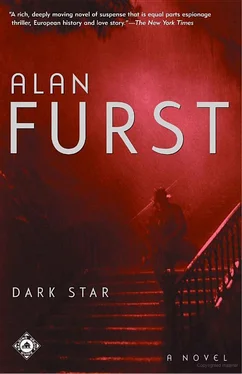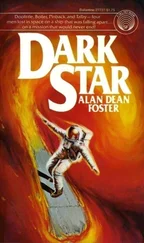Alan Furst - Dark Star
Здесь есть возможность читать онлайн «Alan Furst - Dark Star» весь текст электронной книги совершенно бесплатно (целиком полную версию без сокращений). В некоторых случаях можно слушать аудио, скачать через торрент в формате fb2 и присутствует краткое содержание. Жанр: Шпионский детектив, на английском языке. Описание произведения, (предисловие) а так же отзывы посетителей доступны на портале библиотеки ЛибКат.
- Название:Dark Star
- Автор:
- Жанр:
- Год:неизвестен
- ISBN:нет данных
- Рейтинг книги:3 / 5. Голосов: 1
-
Избранное:Добавить в избранное
- Отзывы:
-
Ваша оценка:
- 60
- 1
- 2
- 3
- 4
- 5
Dark Star: краткое содержание, описание и аннотация
Предлагаем к чтению аннотацию, описание, краткое содержание или предисловие (зависит от того, что написал сам автор книги «Dark Star»). Если вы не нашли необходимую информацию о книге — напишите в комментариях, мы постараемся отыскать её.
Dark Star — читать онлайн бесплатно полную книгу (весь текст) целиком
Ниже представлен текст книги, разбитый по страницам. Система сохранения места последней прочитанной страницы, позволяет с удобством читать онлайн бесплатно книгу «Dark Star», без необходимости каждый раз заново искать на чём Вы остановились. Поставьте закладку, и сможете в любой момент перейти на страницу, на которой закончили чтение.
Интервал:
Закладка:
What had he hoped to find? Not this. A thick stack of grayish paper, frayed at the edges, covered with a careful pen scrawl of stiff Russian phrases-the poetry of bureaucrats. It was official paper, a bluntly printed letterhead announcing its origin as Bureau of Information, Third Section, Department of State Protection (Okhrannoye Otdyelyenye), Ministry of the Interior, Transcaucasian District, with a street address in Tbilisi-the Georgian city of Tiflis.
A slow, sullen disappointment drifted over Szara’s mood. He carried the vodka bottle over to the window and watched as a freight train crawled slowly away from the railway station, its couplings clanking and rattling as the cars jerked into motion. The officer was not a noble colonel or a captain of cavalry but a slow-footed policeman, no doubt a cog in the czar’s vast but inefficient secret police gendarmerie, the Okhrana, and this sheaf of misery on the hotel desk apparently represented a succession of cases, a record of agents provocateurs, payments to petty informers, and solemn physical descriptions of Social Revolutionary party workers in the early days of the century. He’d seen this kind of report from time to time, soul-destroying stuff it was, humanity seen through a window by the dim glow of a street lamp, sad and mean and obsessed with endless conspiracies. The thought of it made you want to retire to the countryside with a milk cow and a vegetable patch.
Not a military officer, a police officer. Poor man, he had carried this catalogue of small deceits over mountain and across desert, apparently certain of its value once the counterrevolution had succeeded and some surviving spawn of the Romanovs once again sat upon the Throne of All the Russias. In sorrow more than anger Szara soothed his frustrated imagination with two tiltings of the vodka bottle. A paper creature, he thought. A uniform with a man in it.
He walked back to the desk and adjusted the gooseneck lamp. The organization Messame Dassy (Third Group) had been founded in 1893, of Social Democratic origin and purpose, in political opposition to Meori Dassy (Second Group)-Szara sighed at such grotesque hair-splitting-and made its views known in pamphlets and the newspaper Kvali (The Furrow). Known principals of the organization included N. K. Jordania, K. K. Muridze, G. M. Tseretelli. The informant DUBOK (it meant “little oak” and had gone on to become the name for a dead-drop of any kind) enrolled and became active in 1898, at age nineteen.
Szara flipped through the stack of pages, his eye falling randomly on summaries of interviews, memoranda, alterations in handwriting as other officers contributed to the record, receipts for informer payments signed with cover names (not code names like DUBOK; one never knew one’s code name, that belonged to the Masters of the File), a change to typewriter as the case spanned the years and reports were sent traveling upward from district to region to central bureau to ministry to Czar Nicholas and perhaps to God Himself.
Szara’s temples throbbed.
Serves you right! What in the name of heaven had he expected? Swiss francs? Perhaps he had, deep down. Those exquisitely printed passports to anywhere and everything. Idiot! Maybe gold coins? The molten rubies of children’s books? Or a single pressed rose, its last dying fragrance only just discernible? Yes, yes, yes. Any or all of it. His eye fell in misery on the false plate lying on the floor amid a tangle of cut-up thread. He’d learned to sew as a child in Odessa, but this was not the sort of job he could do. How was he to put all this back together again? By employment of the hotel seamstress? The guest in Room 35 requires the false bottom sewed back on his suitcase-hurry woman, he must cross the Polish frontier tonight! A victim of betrayed imagination, Szara cursed and mentally called down the apparat as though summoning evil spirits. He willed Heshel with his sad little smile or Renate Braun with her purse full of skeleton keys, or any of them, gray shapes or cold-eyed intellectuals, to come and take this inhuman pettifoggery away from him before he hurled it out the window.
In fact, where were they?
He glanced at the bottom of the door, expecting a slip of paper to come sliding underneath at that very moment, but all he saw was worn carpet. The world suddenly felt very silent to him, and another visit with the vodka did not change that.
In desperation he shoved the paper to one side and replaced it with sheets of hotel stationery from the desk drawer. If, in the final analysis, the officer did not deserve this vodka-driven storm in the emotional latitudes, the anguished people of Prague most assuredly did.
It was midnight when he finished, and his back hurt like a bastard. But he’d gotten it. The reader would find himself; his street, his neighborhood, his nation. And the hysteria, the nightmare, was where it belonged, just below the horizon so you felt it more than saw it. To balance a story on “the people” he’d have to do one on “the ministry”: quote from Benes, quote from General Vlasy, something vicious from Henlein, and the slant-since the country had been created a parliamentary democracy in 1918 and showed no sign of yearning to become a socialist republic-would have to serve Soviet diplomatic interests by fervid anti-Hitlerism. No problem there. He could file on ministries with one eye shut and the pencil in his ear, and it would mean just about that much. Politicians were like talking dogs in a circus: the fact that they existed was uncommonly interesting, but no sane person would actually believe what they said.
Then, as always happened after he wrote something he liked, the room began to shrink. He stuffed some money in his pocket, pulled up his tie, threw on his jacket, and made his escape. He tried walking, but the wind blowing down from Poland was fierce and the air had the smell of winter, so he waved down a taxi and gave the address of the Luxuria, a nachtlokal where the cabaret was foul and the audience worse, thus exactly where he belonged in his present frame of mind.
Nor was he disappointed. Sitting alone at a tiny table, a glass of flat champagne at his elbow, he smoked steadily and lost himself in the mindless fog of the place, content beneath the soiled cutout of yellow paper pinned to a velvet curtain that served as the Luxuria’s moon-a thin slice, a weary old moon for nights when nothing mattered.
Momo Tsipler and his Wienerwald Companions.
Five of them, including the oldest cellist in captivity, a death-eyed drummer called Rex, and Momo himself, one of those dark celebrities nourished by the shadows east of the Rhine, a Viennese Hungarian in a green tuxedo with a voice full of tears that neither he nor anyone else had ever cried.
“Noch einmal als Abschied dein Handchen mir gib,” sang Momo as the cello sobbed. “Just once again give me your hand to press”- the interior Szara was overjoyed, this horrid syrup was delicious, a wicked joke on itself, an anthem to Viennese love gone wrong. The title of the song was perfect: “There Are Things We Must All Forget.” The violinist had fluffy white hair that stood out in wings and he smiled like Satan himself as he played.
The Companions of the Wienerwald then took up a kind of “drunken elephant” theme for the evening’s main attraction; the enormous Mottel Motkevich, who staggered into the spotlight to a series of rimshots from the drummer and began his famous one-word routine. At first, his body told the story: I just woke up in the maid’s bed with the world’s worst hangover and someone pushed me out onto the stage of a nightclub in Prague. What am I doing here? What are you doing here?
His flabby face sweated in the purple lights-for twenty years he’d looked like he was going to die next week. Then he shaded his eyes and peered around the room. Slowly, recognition took hold. He knew what sort of swine had come out to the nachtlokal tonight, ah yes, he knew them all too well. “Ja,” he said, confirming the very worst, his thick lips pressed together with grim disapproval.
Читать дальшеИнтервал:
Закладка:
Похожие книги на «Dark Star»
Представляем Вашему вниманию похожие книги на «Dark Star» списком для выбора. Мы отобрали схожую по названию и смыслу литературу в надежде предоставить читателям больше вариантов отыскать новые, интересные, ещё непрочитанные произведения.
Обсуждение, отзывы о книге «Dark Star» и просто собственные мнения читателей. Оставьте ваши комментарии, напишите, что Вы думаете о произведении, его смысле или главных героях. Укажите что конкретно понравилось, а что нет, и почему Вы так считаете.












